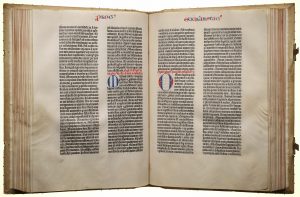
Shownotes
Welcome to Day 1504 of our Wisdom-Trek, and thank you for joining me.
This is Guthrie Chamberlain, Your Guide to Wisdom
Bible Study – Book Order and Hebrew Text – Meditation Monday
Wisdom - the final frontier to true knowledge. Welcome to Wisdom-Trek! Where our mission is to create a legacy of wisdom, to seek out discernment and insights, to boldly grow where few have chosen to grow before. Hello, my friend; I am Guthrie Chamberlain, your captain on our journey to increase Wisdom and Create a Living Legacy. Thank you for joining us today as we explore wisdom on our 2nd millennium of podcasts. This is Day 1504 of our Trek, and it is time for Meditation Monday. Taking time to relax, refocus, and reprioritize our lives is crucial in order to create a living legacy. For you, it may just be time alone for quiet reflection. You may utilize structured meditation practices. In my life, Meditation includes reading and reflecting on God’s Word and in prayer. It is a time to renew my mind, refocus on what is most important, and making sure that I am nurturing my soul, mind, and body. As you come along with me on our trek each Meditation Monday, it is my hope and prayer that you, too, will experience a time for reflection and renewing of your mind.
We are continuing our series this week on Meditation Monday as we focus on Mastering Bible Study through a series of brief insights from Hebrew Scholar, Dr. Michael S. Heiser. Our current insights are focusing on what the Bible is. Today let us meditate on:
Bible Study – Book Order and Hebrew Text
· Insight Thirty-One: The Books in Your Bible Are Not in Chronological Order
Have you ever wondered how historians know when things in the ancient world happened? How can we say with great confidence that some event occurred 1,000 years before Christ (BC)? How- do we know with precision when the events of the life of Jesus and the early Church transpired?
Ancient chronology is a fascinating subject. It’s also amazingly complex since it deals with ancient lists of the reigns of kings that have survived from antiquity and with ancient astronomical observations and their recording. You don’t need to devote yourself to understanding how all these things are known to study the Bible. But it’s pretty important you know the when.
The books in your Bible were not chronologically arranged. Ezekiel was not written after Jeremiah. Paul’s epistles were not written in the order they’re listed in the New Testament. Even books like 1-2 Samuel can be chronologically misleading. Samuel was the last of Israel’s judges, right before the first king, Saul, came along. Consequently, 1-2 Samuel’s content overlaps Samuel’s life and a time that followed the Torah, Joshua, and Judges’ events. But the content of a book doesn’t tell us when a book was written. The fact that 1-2 Samuel never claims to have been written by Samuel adds to the chronological uncertainty.
Consequently, 1-2 Samuel’s content overlaps Samuel’s life and a time that followed the Torah, Joshua, and Judges’ events. But the content of a book doesn’t tell us when a book was written. The fact that 1-2 Samuel never claims to have been written by Samuel adds to the chronological uncertainty.
Scholars have done their best to determine when the books of the Bible were written, but there’s a lot of disagreement. Yet the effort is worth it because knowing when a book was written is essential for developing theological ideas.
For example, what Paul says about faith and works in Galatians (perhaps his earliest epistle) sounds a bit different than it does in Romans. Paul’s comments are specific to events in Galatians, whereas Romans reflects a fuller treatment of the issue, one that benefits from years of preaching and addressing the issue in churches.
Another reason to know when a book was written is that it provides a glimpse of the writer’s world. Knowing that the Egyptians wrote about the invasion of the Sea Peoples (from whom the Philistines derive) along the Canaan coast helps us put certain references to the Philistines in the Old Testament in context.
Fortunately, this sort of information is available in reference works and good commentaries. Taking time to get your chronological bearings helps interpretation.
· Insight Thirty-Two: The Traditional Hebrew Text of The Old Testament Did Not Fall From Heaven
 I’ve already talked a little about how God did not specially create Greek for the New Testament. That myth was popular before the late nineteenth century, and it remains influential to this day. A similar myth claims that the traditional Hebrew Old Testament (the Masoretic text) deserves special sacred status. It doesn’t, and being influenced by that idea can hinder your Bible study.
I’ve already talked a little about how God did not specially create Greek for the New Testament. That myth was popular before the late nineteenth century, and it remains influential to this day. A similar myth claims that the traditional Hebrew Old Testament (the Masoretic text) deserves special sacred status. It doesn’t, and being influenced by that idea can hinder your Bible study.
Several tools can help English readers with the original languages. Other tools guide English readers to what various manuscripts say that might diverge from something in their translation. Manuscript copies of the Hebrew Old Testament have slight variations, none of which affect central doctrines, and Bible translations will sometimes note these small wording changes. If you think the traditional Hebrew text is sacrosanct, these tools won’t help you.
The myth claims that the Hebrew text hasn’t changed since its original composition—that the ancient Jewish scribes, the Masoretes, didn’t change a letter. The Dead Sea scrolls are often rolled out to make this argument. But it’s a myth, and the scrolls themselves demonstrate that.
The problem with the myth is that the work of the Masoretes only began around AD 100, when the Jewish religious authorities standardized the Hebrew Bible (the Old Testament). There were various manuscripts of the Hebrew Bible in existence before that time. The most important one is the text from which the Septuagint, the Greek translation of the Old Testament, was created. The Septuagint was very popular with early Christians and, naturally, with the writers of the New Testament. It was popular because it was a Greek translation. However, the Hebrew text from which the Septuagint was translated and the text known today as the Masoretic text differs in some ways.
The rabbis wanted a standardized text for their community. So in AD 100, they took the existing texts and used them to produce a single text that would be copied down from that point on. That’s the Masoretic text. The Dead Sea Scrolls preserve differences from other texts. Those other texts are where many of the marginal notes in your study Bible come from.
My point is this: don’t be afraid to seriously entertain an alternative textual reading in your Bible’s footnotes. You might be returning to the original reading.
Study this Book of Instruction continually. Meditate on it day and night so you will be sure to obey everything written in it. Only then will you prosper and succeed in all you do.
That is a wrap for today’s Meditation. Next week we will continue our trek on Meditation Monday as we take time to reflect on what is most important in creating our living legacy. On tomorrow’s trek, we will explore another wisdom quote. This 3-minute wisdom supplement will assist you in becoming healthy, wealthy, and wise each day. Thank you for joining me on this trek called life. Encourage your friends and family to join us and then come along tomorrow for another day of ‘Wisdom-Trek, Creating a Legacy.’  If you would like to listen to any of the past 1503 daily treks or read the daily Journal, they are available at Wisdom-Trek.com. I encourage you to subscribe to Wisdom-Trek on your favorite podcast player so that each day will be downloaded to you automatically.
If you would like to listen to any of the past 1503 daily treks or read the daily Journal, they are available at Wisdom-Trek.com. I encourage you to subscribe to Wisdom-Trek on your favorite podcast player so that each day will be downloaded to you automatically.
Thank you for allowing me to be your guide, mentor, and most importantly, I am your friend as I serve you through this Wisdom-Trek podcast and Journal.
As we take this Trek of life together, let us always:
- Live Abundantly (Fully)
- Love Unconditionally
- Listen Intentionally
- Learn Continuously
- Lend to others Generously
- Lead with Integrity
- Leave a Living Legacy Each Day
I am Guthrie Chamberlain….reminding you to ’Keep Moving Forward,’ ‘Enjoy your Journey,’ and ‘Create a Great Day…Everyday’! See you tomorrow!